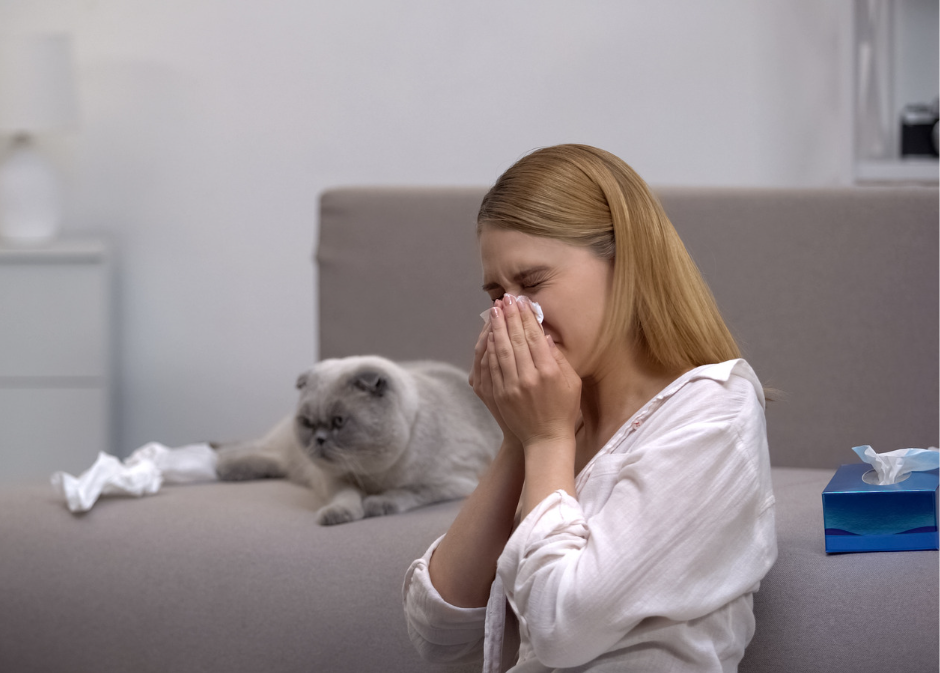Cats are one of the most popular pets in the world. They are cute and cuddly and provide great company. However, not everyone can enjoy the company of cats due to cat allergies. Cat allergies are caused by a reaction to proteins in a cat’s saliva, urine, and dander. These allergens are carried through the air and can cause symptoms ranging from mild to severe. Fortunately, cat allergy medicine is available to treat them.
Cat Allergy Symptoms
Cat allergy symptoms can vary from person to person, but common symptoms include the following:
- Sneezing
- Runny or stuffy nose
- Itchy, watery eyes
- Scratchy throat
- Wheezing or shortness of breath
- Skin rash or hives
- Fatigue
- Headache
In severe cases, cat allergies can cause an asthma attack, which can be life-threatening. It is essential to seek medical attention if you experience any of these symptoms, especially if you have a history of asthma.
Medicines for Cat Allergies
There are several medicines available to treat cat allergies. The type of medicine prescribed will depend on the severity of the symptoms and the individual’s medical history. Some common medications for cat allergies include:
- Antihistamines – Antihistamines are commonly used to treat allergies. They block histamine released by the body in response to allergens. Some common antihistamines include loratadine (Claritin), cetirizine (Zyrtec), and fexofenadine (Allegra). These medicines are available over-the-counter.
- Decongestants – Decongestants can help relieve nasal congestion caused by cat allergies. They work by narrowing the blood vessels in the nasal passages, which reduces swelling and congestion. Some common decongestants include phenylephrine and pseudoephedrine. These medicines are available over the counter but can cause side effects such as increased heart rate and elevated blood pressure.
- Nasal Steroids – Nasal steroids are prescription medicines that can help relieve inflammation in the nasal passages. They work by reducing the production of inflammatory chemicals in the body. Some common nasal steroids include fluticasone (Flonase) and mometasone (Nasonex). These medicines are available in nasal spray form and can help relieve moderate to severe symptoms.
- Immunotherapy – Immunotherapy, also known as allergy shots, is a treatment that can help reduce the severity of cat allergies. This treatment involves injecting small amounts of cat allergen under the skin, gradually increasing the dose. This allows the body to build up a tolerance to the allergen, reducing the severity of allergic reactions. Immunotherapy is typically used for people with severe allergies who do not respond to other treatments.
- Eye Drops – Eye drops can help relieve itchy, watery eyes caused by cat allergies. Some common eye drops include ketotifen (Zaditor) and olopatadine (Patanol). These medicines are available over-the-counter and can help relieve mild to moderate symptoms.
Preventing Cat Allergies

-
Choose a hypoallergenic breed.
If you’re considering getting a cat, choosing a hypoallergenic breed is one of the best ways to prevent cat allergies. Hypoallergenic cats produce fewer allergens, making them less likely to cause an allergic reaction. Some popular hypoallergenic breeds include the Sphynx, Devon Rex, and Cornish Rex.
-
Keep your home clean.
Cleaning your home regularly is one of the most effective ways to reduce the amount of cat allergens in your home. Use a vacuum cleaner with a HEPA filter to remove cat hair and dander from carpets and upholstery. Wipe down surfaces with a damp cloth, and use an air purifier to filter out allergens from the air.
-
Bathe your cat regularly.
Regular bathing can help to reduce the amount of allergens that your cat produces. Use a cat-specific shampoo and warm water for bathing your cat, taking care not to get water in their ears. Be sure to dry your cat thoroughly after their bath to prevent them from catching a cold.
-
Keep your cat out of the bedroom.
If you’re prone to cat allergies, keeping your cat out of your bedroom is best. This will help to reduce your exposure to cat allergens while you sleep, which can help to prevent allergic reactions. Consider closing your bedroom door or using a pet gate to keep your cat out.
-
Wash your hands frequently.
Washing your hands frequently is one of the simplest ways to prevent cat allergies. Cat allergens can stick to your hands, so wash them thoroughly after handling your cat. This will help to reduce the risk of transferring allergens to your eyes or mouth.
-
Consider immunotherapy
Immunotherapy, also known as allergy shots, is a treatment that can help to reduce the severity of allergic reactions over time. Immunotherapy involves injecting small amounts of allergens into your body, which helps your immune system tolerate the allergen. This can be an effective long-term solution for people with severe cat allergies.
In Summary
In conclusion, preventing cat allergies requires a multi-faceted approach that involves reducing exposure to allergens and building a tolerance to them over time. By choosing a hypoallergenic breed, keeping your home clean, bathing your cat regularly, keeping your cat out of the bedroom, washing your hands frequently, and considering immunotherapy, you can reduce the risk of allergic reactions and enjoy the companionship of your feline friend.











